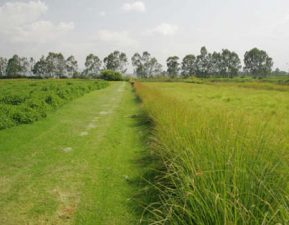 The Leaf won’t be sprouting its electric engines soon in the Middle East, says Nissan CEO.
The Leaf won’t be sprouting its electric engines soon in the Middle East, says Nissan CEO.
Nissan’s new Leaf electric car model may be about to roll off the company’s production lines, but it will be a while before it will be available in Middle Eastern markets, according to the company’s CEO, Carlos Ghosn. The Leaf, hailed by Nissan as a totally electric and emission free vehicle was featured in a previous Green Profit article I where Mr. Ghosn said that “the Middle East is not a prime target for electric vehicles.” Mr. Ghosn made these remarks during a press conference in Abu Dhabi, where he launched a jazzy new 4 X 4 model called the 2011 Nissan Patrol SUV, which according to the Nissan CEO seems to have the kind of “qualities” that customers in Middle Eastern countries are more interested in:
- such as a 5.6 liter V8 gasoline engine
- an advanced AC cooling system designed to keep the car’s occupants pleasantly comfortable in the hottest weather conditions
- a state-of-the-art media and entertainment system that can play all the latest downloaded music hits
- internet linkage and WIFI wireless service to all the world’s security and commodities markets
Ghosn’s press conference was covered by international media correspondents, including those from Abu Dhabi’s The National in which he added that “not a lot of governments in the Middle East came to us and said they were interested” in providing the necessary infrastructure needed for electric powered vehicles to be successful.
The reference to the word “infrastructure” seems to say it all as Mr. Ghosn is aware that since most countries in the Middle East as still classified as being developing or underdeveloped, there is simply not the interest or the infrastructure necessary to support a type of car where its lithium-ion batteries have to be either recharged or exchanged every 160 km.
On the other hand, Mr. Ghosn and his marketing strategists believe that cars like the Nissan Patrol 4×4, which is hailed as having an 18 km per liter fuel economy as the company’s best option for locations where oil is still relatively plentiful and electricity for electric car “recharging posts” is not. We say smaller cars are a better option, not 4x4s!
Nissan plans to concentrate on the US, Japan, Europe, and the UK for the Leaf’s best market potentials. The car’s first production run will be 500,000 vehicles, less than one per cent of the company’s global market output. At the 2010 World Future Energy Summit held last month in Abu Dhabi, delegates detailed plans in other countries to make the purchase of electric vehicles easier.
Ghosn hinted his company’s marketing strategy vis-à-vis the Middle East when he said: “we will concentrate on countries who are not major petroleum exporters and who are concerned with their CO2 emissions.”
Although not mentioned in The National, there is one Middle Eastern country where the infrastructure for electric cars may in place sooner even than countries like the US and Europe. In Israel, which is often excluded from Middle East talks and opportunities due to political interests is where the development of electric cars, and the battery recharging and exchange stations necessary to support them is already being worked on by Better Place.
The electric car company hopes to make its vehicles brand synonymous with Israel like the Jaffa orange. And a major investment might make that happen: funding for more than $350 million from the international banking consortium HBSC went through recently.
A considerable amount of the technology to has gone into developing the Leaf has actually come from Better Place, which has signed agreements with Renault Nissan, and which recently launched a test drive and electric car education facility in Israel.
From MIT’s Technology Review:
Nissan has been working with a company called Better Place on a strategy for extending the range of EVs. The idea is to build battery swap stations along major highways. Drive in and a simple robot takes out your car’s depleted battery and inserts a charged one, and you’re quickly on your way again. Nissan demonstrated one version of a swap station in May.
GM’s Volt Vs Renault-Nissan’s Electric “Better Place” Edition
Better Place Tests Batter Replacement Technology in Japan
Israel Railways Teams Up With Better Place to Refuel Electric Car Commutors



Nissan and Chevy have a lot to think about as they roll out these plug-in hybrids. Tax credits will encourage some consumers to go forward with the charger installations, but for the rest there will be a lot of questions about how much the charges will cost to install and maintain.Researching how to make your company, product, or next project more Green? Go to http://www.greencollareconomy.com for sustainability white papers and the largest b2b green directory on the web.